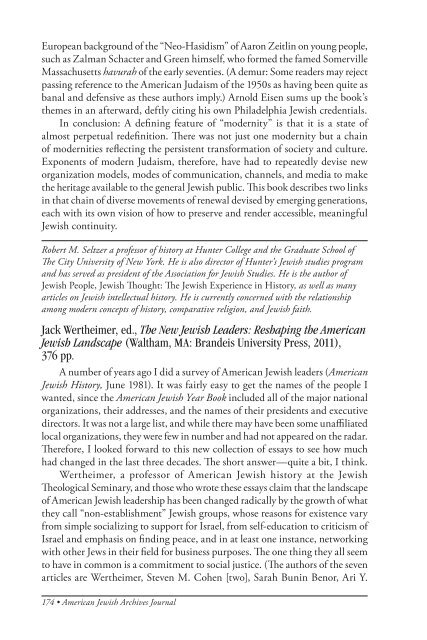American Jewish Archives Journal, Volume 64, Numbers 1 & 2
American Jewish Archives Journal, Volume 64, Numbers 1 & 2
American Jewish Archives Journal, Volume 64, Numbers 1 & 2
You also want an ePaper? Increase the reach of your titles
YUMPU automatically turns print PDFs into web optimized ePapers that Google loves.
European background of the “Neo-Hasidism” of Aaron Zeitlin on young people,<br />
such as Zalman Schacter and Green himself, who formed the famed Somerville<br />
Massachusetts havurah of the early seventies. (A demur: Some readers may reject<br />
passing reference to the <strong>American</strong> Judaism of the 1950s as having been quite as<br />
banal and defensive as these authors imply.) Arnold Eisen sums up the book’s<br />
themes in an afterward, deftly citing his own Philadelphia <strong>Jewish</strong> credentials.<br />
In conclusion: A defining feature of “modernity” is that it is a state of<br />
almost perpetual redefinition. There was not just one modernity but a chain<br />
of modernities reflecting the persistent transformation of society and culture.<br />
Exponents of modern Judaism, therefore, have had to repeatedly devise new<br />
organization models, modes of communication, channels, and media to make<br />
the heritage available to the general <strong>Jewish</strong> public. This book describes two links<br />
in that chain of diverse movements of renewal devised by emerging generations,<br />
each with its own vision of how to preserve and render accessible, meaningful<br />
<strong>Jewish</strong> continuity.<br />
Robert M. Seltzer a professor of history at Hunter College and the Graduate School of<br />
The City University of New York. He is also director of Hunter’s <strong>Jewish</strong> studies program<br />
and has served as president of the Association for <strong>Jewish</strong> Studies. He is the author of<br />
<strong>Jewish</strong> People, <strong>Jewish</strong> Thought: The <strong>Jewish</strong> Experience in History, as well as many<br />
articles on <strong>Jewish</strong> intellectual history. He is currently concerned with the relationship<br />
among modern concepts of history, comparative religion, and <strong>Jewish</strong> faith.<br />
Jack Wertheimer, ed., The New <strong>Jewish</strong> Leaders: Reshaping the <strong>American</strong><br />
<strong>Jewish</strong> Landscape (Waltham, MA: Brandeis University Press, 2011),<br />
376 pp.<br />
A number of years ago I did a survey of <strong>American</strong> <strong>Jewish</strong> leaders (<strong>American</strong><br />
<strong>Jewish</strong> History, June 1981). It was fairly easy to get the names of the people I<br />
wanted, since the <strong>American</strong> <strong>Jewish</strong> Year Book included all of the major national<br />
organizations, their addresses, and the names of their presidents and executive<br />
directors. It was not a large list, and while there may have been some unaffiliated<br />
local organizations, they were few in number and had not appeared on the radar.<br />
Therefore, I looked forward to this new collection of essays to see how much<br />
had changed in the last three decades. The short answer—quite a bit, I think.<br />
Wertheimer, a professor of <strong>American</strong> <strong>Jewish</strong> history at the <strong>Jewish</strong><br />
Theological Seminary, and those who wrote these essays claim that the landscape<br />
of <strong>American</strong> <strong>Jewish</strong> leadership has been changed radically by the growth of what<br />
they call “non-establishment” <strong>Jewish</strong> groups, whose reasons for existence vary<br />
from simple socializing to support for Israel, from self-education to criticism of<br />
Israel and emphasis on finding peace, and in at least one instance, networking<br />
with other Jews in their field for business purposes. The one thing they all seem<br />
to have in common is a commitment to social justice. (The authors of the seven<br />
articles are Wertheimer, Steven M. Cohen [two], Sarah Bunin Benor, Ari Y.<br />
174 • <strong>American</strong> <strong>Jewish</strong> <strong>Archives</strong> <strong>Journal</strong>
















